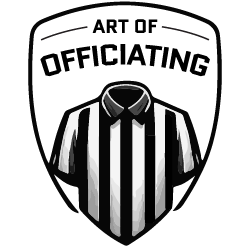In his 3-2-1 Thursday newsletter, James Clear wrote: “The person who learns the most in any classroom is the teacher. If you really want to learn a topic, then ‘teach’ it. Teach a class. Build a product. The act of making something will force you to learn more deeply than reading ever will.”
That principle applies perfectly to football officiating.
Most of us consume a lot of information. We read the rules book. We highlight the mechanics manual. We sit through clinics and webinars. All of that is valuable, but it only takes us so far. Consumption fills our heads with knowledge, but it doesn’t guarantee retention or application.
Production, on the other hand, forces us to test our understanding. When we explain a rule to a new official, we find out quickly whether we really know it. When we create a pregame checklist for our crew, we discover the gaps in our mechanics knowledge. When we prepare a short talk for our local association, we realize what we’ve mastered—and what we haven’t.
When we teach, we can’t just repeat phrases from the rules book. We need to break down concepts, simplify them, and connect them to real-life situations. That takes a different level of mastery.
For example, it’s one thing to read the rule about first touching a free or scrimmage kick. It’s another thing entirely to explain that to a coach during a game. When we can explain it clearly to someone else, we’ve moved beyond memorization into true understanding.
So how do we shift from being just a consumer to being a producer of information? We don’t need a classroom or a newsletter. We just need to share what we’re learning.
Ask your association’s leadership if you can take a turn leading or teaching. It takes some courage to stand in front of your peers, but that’s the point; when you commit to teaching, you force yourself to dig deeply into the rule or mechanic. You can’t just skim. You need to understand it well enough to explain it clearly. That process alone will sharpen your knowledge. You don’t have to deliver a 60-minute clinic. Even leading a 10-minute discussion on a single rule or case play is valuable. The act of preparing and sharing is what pushes you to a higher level of mastery.
Many new officials join an association full of enthusiasm, only to feel overlooked once the season begins. Too often, they drift through a year or two without connection and eventually walk away. As veterans, we can change that. Seek out a new official. Invite them to join a varsity pregame, to walk the sideline during the game, and then to sit in on the postgame debrief. Call or email them to discuss a rules situation. Committing to mentor a new official isn’t just about helping them; it sharpens your own understanding and strengthens the association. When you invest in someone else’s growth, both of you improve.
Lead a crew discussion. Ask your white hat if you can lead the pregame discussion. Or ask him if you can take five minutes in the locker room to present a rule situation or penalty enforcement example.
Write it down. Keep a simple notebook where you jot down unusual plays you’ve seen or rules you’ve studied. The act of physically writing locks the information into your memory in a way that just reading doesn’t. When you write it out, you’re processing the concept a second time, which helps you retain it.
Write quiz questions to share with other officials. Creating a good question forces you to break down a rule or mechanic into its core components. It definitely will force you to dig deeper into a concept.
Debrief after games. Don’t just replay mistakes in your head. Talk them through with another official. Producing an explanation forces you to clarify your thinking.
It’s easy to be a consumer. You sit back, listen, and absorb. But if you want to accelerate your growth, step up and be a producer.
Bottom line: Don’t just consume the information. Produce something with it. Teach it, explain it, write it, or share it. When you do, you’ll find your rules knowledge sharpens and your judgment improves. The teacher always learns the most.
Quiz
Read the quiz stem and then choose the best answer.
On the first play in overtime, A12 retreats and is sacked on the B-15 and fumbles. A79 recovers the ball on the B-22. It is now 2/G from the B-22. A12 again retreats and passes the ball to A17, who is downed at the B-24. B77 is flagged for roughing the passer.
- 1/G from the B-11
- 1/10 from the B-11 (set the chains)
- 1/G from the B-12
- 1/10 from the B-12 (set the chains)
Review Rule 9-4-4 PENALTY and Resolving Tied Games 5-2-1 and 5-3-1
